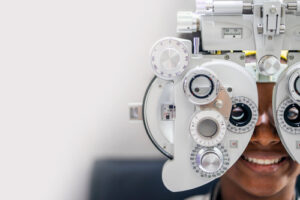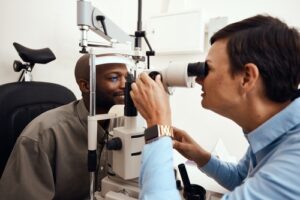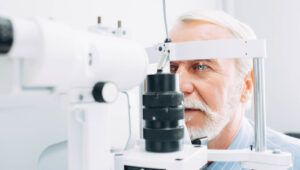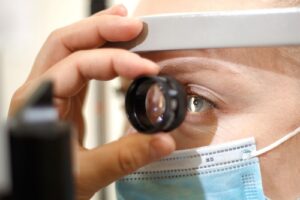What Is the Importance of a Medical Eye Exam?
Many people think that if they aren’t having any issues with their vision and don’t need to update their prescription, an eye exam isn’t necessary. However, an eye exam does much more than that!
Eye exams are vital to maintaining your eye health. They keep you seeing clearly and ensure your eyes are working as they should.
For this reason, it’s recommended that you schedule regular exams, regardless of whether or not you’ve noticed any changes to your vision. There are many ways that exams support your ocular health.
Keep reading to find out why medical eye exams are important!
What Does an Eye Exam Involve?
During an eye exam, your doctor will use a variety of tests to closely evaluate your eyes and check you for signs of many different eye conditions.
Refraction
One part of an eye exam is a refraction test. This test assesses which lenses help your eyes focus on objects at different distances. It also determines your amount of refractive error.
Refractive errors are caused by an irregular eye shape that prevents the eye from focusing light properly. Nearsightedness, farsightedness, and astigmatism are refractive errors.
 If this is the first time you’ve needed glasses or contacts, the doctor will determine which prescription is right for you. If you already wear glasses or contacts, this will determine whether your vision has changed and whether you need a new prescription.
If this is the first time you’ve needed glasses or contacts, the doctor will determine which prescription is right for you. If you already wear glasses or contacts, this will determine whether your vision has changed and whether you need a new prescription.
The information gathered from a refraction test can also be used to correct your vision surgically if you so choose. To figure out the right prescription for you, the doctor will seat you in front of a machine called a phoropter.
It contains lenses with different focusing powers. They will ask you to read from a chart of letters using different lenses.
Then, they’ll ask which allows you to see more clearly. The goal is to choose lenses that bring your vision as close to 20/20 as possible.
Dilation

The exam does not end with determining your prescription. There are still many different aspects of your ocular health to be checked.
Your eye doctor will screen you for signs of cataracts, glaucoma, and macular degeneration. To do this, your eye doctor will dilate your eyes with eye drops.
Dilation allows the doctor to better examine the small structures at the back of your eye using a tool called a slit-lamp microscope. These include the retina and optic nerve.
There are many eye conditions that can affect your retina, which is located at the back of your eye. This structure converts light into electrical signals that the brain can use to form images.
Macular degeneration, for example, can make your central vision blurry. Your doctor will closely study your retina to ensure it looks healthy.
They may take an image of the back of your eye using a test called optical coherence tomography (OCT). Other conditions like diabetes, hypertension, thyroid disease, neurologic disorders, and rheumatologic disease can affect your eyes, so your eye doctor will check for signs of those as well.
Eye Pressure
Another important part of an eye exam is eye pressure testing. Your eye doctor will test your eye pressure using a tonometry test.
It is likely that your eye pressure will be measured every time you visit your eye doctor. High eye pressure can indicate glaucoma, and the early detection of this eye condition is vital for preventing vision loss.
Why Is an Eye Exam Important?
Eye exams are considered preventative. They allow your eye doctor to spot early signs of various eye conditions before they can seriously affect your vision. 
Many eye conditions develop slowly over time. In the early stages, they may not affect your vision significantly.
For example, many people with glaucoma do not realize they have it until their eye doctor sees signs of it during an exam or it begins to compromise their vision. That’s why glaucoma is often referred to as the “silent thief of sight.”
Unfortunately, with glaucoma, once the damage has occurred, it cannot be reversed. While you may not notice signs of eye conditions developing, your eye doctor is a trained professional who can spot even the earliest signs.
Most of the time, the earlier your eye doctor can intervene, diagnose, and treat a condition, the better the outcome. When it comes to your eye health, getting regular eye exams is one of the best things you can do.
They ensure your eyes are able to provide clear vision for today and the future.
How Often Should You Get an Eye Exam?

You hear about the importance of getting regular eye exams, but how often should that actually be? Well, the answer is not the same for everyone.
The American Academy of Ophthalmology recommends that those with good eye health have a full exam once in their 20s, twice in their 30s, and then another at 40. When you are 65 or older, an exam should be scheduled every year or two.
If you wear contacts, have a family history of eye disease, or have a condition like diabetes, a more frequent exam schedule may be recommended. Always follow your eye doctor’s recommendations to support healthy eyes and clear vision.
Are you due for a medical eye exam? Schedule an appointment at Complete EyeCare West in Columbus, OH, today!







